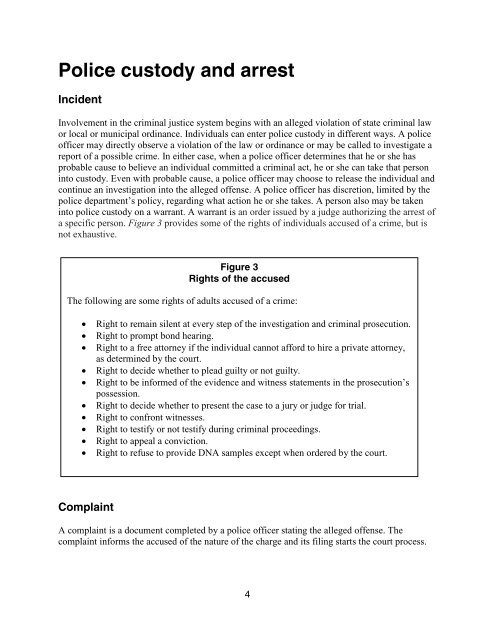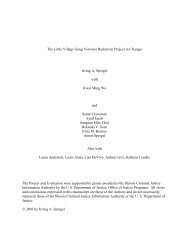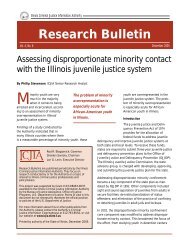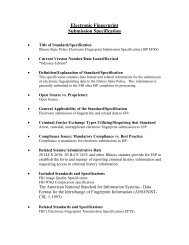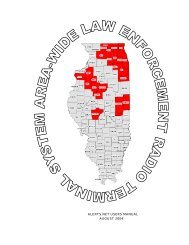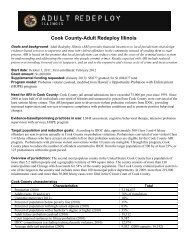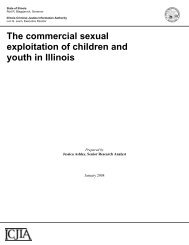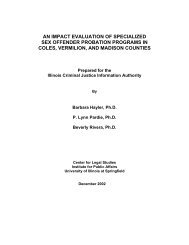policies and procedures of the illinois criminal justice system
policies and procedures of the illinois criminal justice system
policies and procedures of the illinois criminal justice system
You also want an ePaper? Increase the reach of your titles
YUMPU automatically turns print PDFs into web optimized ePapers that Google loves.
Police custody <strong>and</strong> arrest<br />
Incident<br />
Involvement in <strong>the</strong> <strong>criminal</strong> <strong>justice</strong> <strong>system</strong> begins with an alleged violation <strong>of</strong> state <strong>criminal</strong> law<br />
or local or municipal ordinance. Individuals can enter police custody in different ways. A police<br />
<strong>of</strong>ficer may directly observe a violation <strong>of</strong> <strong>the</strong> law or ordinance or may be called to investigate a<br />
report <strong>of</strong> a possible crime. In ei<strong>the</strong>r case, when a police <strong>of</strong>ficer determines that he or she has<br />
probable cause to believe an individual committed a <strong>criminal</strong> act, he or she can take that person<br />
into custody. Even with probable cause, a police <strong>of</strong>ficer may choose to release <strong>the</strong> individual <strong>and</strong><br />
continue an investigation into <strong>the</strong> alleged <strong>of</strong>fense. A police <strong>of</strong>ficer has discretion, limited by <strong>the</strong><br />
police department’s policy, regarding what action he or she takes. A person also may be taken<br />
into police custody on a warrant. A warrant is an order issued by a judge authorizing <strong>the</strong> arrest <strong>of</strong><br />
a specific person. Figure 3 provides some <strong>of</strong> <strong>the</strong> rights <strong>of</strong> individuals accused <strong>of</strong> a crime, but is<br />
not exhaustive.<br />
Figure 3<br />
Rights <strong>of</strong> <strong>the</strong> accused<br />
The following are some rights <strong>of</strong> adults accused <strong>of</strong> a crime:<br />
• Right to remain silent at every step <strong>of</strong> <strong>the</strong> investigation <strong>and</strong> <strong>criminal</strong> prosecution.<br />
• Right to prompt bond hearing.<br />
• Right to a free attorney if <strong>the</strong> individual cannot afford to hire a private attorney,<br />
as determined by <strong>the</strong> court.<br />
• Right to decide whe<strong>the</strong>r to plead guilty or not guilty.<br />
• Right to be informed <strong>of</strong> <strong>the</strong> evidence <strong>and</strong> witness statements in <strong>the</strong> prosecution’s<br />
possession.<br />
• Right to decide whe<strong>the</strong>r to present <strong>the</strong> case to a jury or judge for trial.<br />
• Right to confront witnesses.<br />
• Right to testify or not testify during <strong>criminal</strong> proceedings.<br />
• Right to appeal a conviction.<br />
• Right to refuse to provide DNA samples except when ordered by <strong>the</strong> court.<br />
Complaint<br />
A complaint is a document completed by a police <strong>of</strong>ficer stating <strong>the</strong> alleged <strong>of</strong>fense. The<br />
complaint informs <strong>the</strong> accused <strong>of</strong> <strong>the</strong> nature <strong>of</strong> <strong>the</strong> charge <strong>and</strong> its filing starts <strong>the</strong> court process.<br />
4


